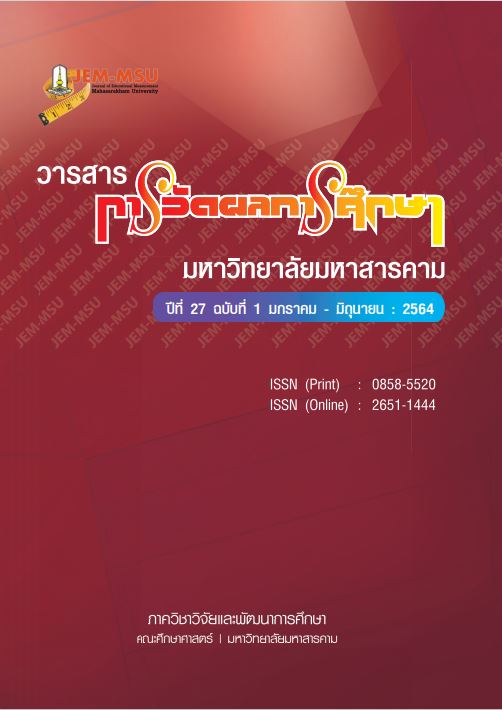Development of Educational Measurement and Evaluation Capacity Building for Preservice Teachers using Empowerment Evaluation Model
Main Article Content
Abstract
The purposes of this research were to 1) develop a model of educational measurement and evaluation capacity building for preservice teachers using empowerment evaluation, 2) study the results of the experiment of the educational measurement and evaluation capacity building for preservice teachers using empowerment evaluation. The sample consisted of preservice teachers, mentors and educational supervisors. The sample was divided into experimental and control groups. The research Instruments consisted of a model quality evaluation form, a test, a skills evaluation form and a test on attitude towards educational measurement and evaluation.
The research findings indicated that: 1) The model of educational measurement and evaluation capacity building for preservice teachers using empowerment evaluation consisted of 7 steps as follows: 1) Pre-Training, 2) Established Mission, 3) Taking Stocks, 4) Planning, 5) Process Evaluation, 6) Outcome Evaluation and 7) Sharing. Twenty-two weeks were spent to complete all of the activities. Each step used strategies and principles of empowerment evaluation by using an application on the smart phone or tablet together with field work. The experts evaluated that the model had the highest quality of suitability and feasibility. The result of the experiment of the model of educational measurement and evaluation capacity building for preservice teachers using empowerment evaluation revealed that the preservice teachers were able to improve the educational measurement and evaluation capacity building, especially the preservice teachers in the experimental group. Their mean of knowledge, understanding and practical skills in educational measurement and evaluation was significantly higher than the control group at the .05 level. There were no differences in the attitude towards educational measurement and evaluation.
In using empowerment evaluation, it is advisable to consider the characteristics of the assessor because the assessor needs to stimulate and to follow up until the preservice teachers meet the specified goals.
Article Details
The content and information contained in the published article in the Journal of Educational Measurement Mahasarakham University represent the opinions and responsibilities of the authors directly. The editorial board of the journal is not necessarily in agreement with or responsible for any of the content.
The articles, data, content, images, etc. that have been published in the Journal of Educational Measurement Mahasarakham University are copyrighted by the journal. If any individual or organization wishes to reproduce or perform any actions involving the entirety or any part of the content, they must obtain written permission from the Journal of Educational Measurement Mahasarakham University.
References
ชุลีพร ผมพันธ์. (2555). การวิจัยและพัฒนาโปรแกรมประสบการณ์วิชาชีพครู สำหรับนิสิตนักศึกษาวิชาเอก ประถมศึกษา ตามแนวทฤษฎีทวิปริทัศน์และแนวคิดปริสีมาที่สาม. วิทยานิพนธ์ปริญญาดุษฎีบัณฑิต, สาขาหลักสูตรและการสอน, คณะครุศาสตร์, จุฬาลงกรณ์มหาวิทยาลัย.
นิติ นาชิต, ชัยวิชิต เชียรชนะ และสิริรักษ์ รัชชุศานติ. (2560). การประยุกต์ใช้รูปแบบการประเมินหลักสูตรวิชาชีพระยะสั้นตามแนวคิดการประเมินแบบเสริมพลังอำนาจในสถานศึกษาอาชีวศึกษา. วาสารศึกษาศาสตร์ มหาวิทยาลัยนเรศวร, 9(3), 180-197.
นิธิวัฒน์ อินทสิทธิ์. (2550). เจตคติต่อวิชาชีพครูของครูที่สอนในโรงเรียนสังกัดสำนักงานคณะกรรมการการศึกษาเอกชน สำนักงานเขตพื้นที่การศึกษากรุงเทพมหานครเขต 2. วิทยานิพนธ์ปริญญามหาบัณฑิต, สาขาการวัดและประเมินผลการศึกษา, คณะศึกษาศาสตร์, มหาวิทยาลัยรามคำแหง.
ธัญญารัศม์ จอกสถิตย์. (2553). โมเดลการพัฒนาการปฏิบัติงานของครู: การประยุกต์ใช้แนวคิดการประเมินครู ที่เน้นการปฏิบัติงานเป็นฐานและการประเมินแบบเสริมพลังอำนาจ. วิทยานิพนธ์ปริญญาดุษฎีบัณฑิต, สาขาการวัดและประเมินผลการศึกษา, คณะครุศาสตร์, จุฬาลงกรณ์มหาวิทยาลัย.
ศิริชัย กาญจนวาสี. (2559). การประเมินแบบเสริมพลัง: นานาทัศนะ. สารสมาคมวิจัยสังคมศาสตร์แห่งประเทศไทย, 3(1), 19-26.
สาธิดา สกุลรันตนกุลชัย. (2553). การพัฒนารูปแบบการประเมินการเรียนการสอนแบบสตูดิโอทางสถาปัตยกรรมโดยใช้การประเมินแบบเสริมพลังอำนาจ. วิทยานิพนธ์ปริญญาดุษฎีบัณฑิต, สาขาการวัดและประเมินผลการศึกษา, คณะครุศาสตร์, จุฬาลงกรณ์มหาวิทยาลัย.
สุจินดา ม่วงมี. (2549). บทบาทและความรับผิดชอบของอาจารย์นิเทศตามการรับรู้ของนิสิตฝึกสอน อาจารย์พี่เลี้ยง และอาจารย์นิเทศก์. วารสารศึกษาศาสตร์. 17(2), 31-46.
มณีรัตน์ โนนหัวรอ. (2557). การพัฒนารูปแบบการประเมินเสริมพลังอำนาจเพื่อพัฒนาสมรรถนะด้านการวัดและประเมินผลการศึกษาของครูประจำการ สังกัดสำนักงานเขตพื้นที่การศึกษาประถมศึกษาปราจีนบุรี เขต 2. วิทยานิพนธ์ปริญญาดุษฎีบัณฑิต, สาขาการทดสอบและวัดผลการศึกษา, บัณฑิตวิทยาลัย, มหาวิทยาลัยศรีนครินทรวิโรฒ.
วรรณทิพา รอดแรงค้า และภาวิณี ศรีสุขวัฒนานันท์. (2545). ปัญหาการฝึกประสบการณ์วิชาชีพของนิสิตสาขาการสอนวิทยาศาสตร์. ภาควิชาการศึกษา คณะศึกษาศาสตร์ มหาวิทยาลัยเกษตรศาสตร์ ปีการศึกษา 2544. วารสารเกษตรศาสตร์, 23, 104-117.
เหมวรรณ ขันมณี. (2559). การพัฒนาชุดการเรียนรู้ด้วยตนเองสำหรับนิสิตนักศึกษาฝึกประสบการณ์วิชาชีพ สาระการเรียนรู้ภาษาอังกฤษในระดับประถมศึกษา. คณะครุศาสตร์, จุฬาลงกรณ์มหาวิทยาลัย.
อติยศ สรรคบุรานุรักษ์ และศศิณัฎฐ์ สรรคบุรานุรักษ์. (2558). การจัดการเรียนการสอนที่เน้นความแตกต่างระหว่างบุคคล. วารสารศึกษาศาสตร์ มหาวิทยาลัยศิลปากร, 12, 39-48
Avidov-Unger & Tamar Shamir-Inbal. (2013). Empowerment Patterns of Leaders in ICT and School Strengths Following the Implementation of National ICT Reform. Journal of Information Technology Education: Research, 12, 141-157.
Beziat, T. L. R., & Coleman, B. K. (2015). Classroom assessment literacy: Evaluating pre-service teacher. The Researcher, 27(1), 25-30.
Fang, Z. (2013). Learning to teach Against the Institutional Grain: A Professional Development Model for Teacher Empowerment. School of Teaching and Learning, College of Education, University of Florida.
Fetterman, D. M., & Wandersman, A. (2005). Empowerment evaluation principles in practice. New York : Guilford Press.
Kaden, U.I., Patterson, P.P. & Healy, J. (2014). Updating the Role of Rural Supervision: Perspectives from Alaska. Journal of Education and Training Studies, 2(3), 33-43.
Smith, C.F., & Goodwin, D. (2014). A guided empowerment self-audit as a school improvement strategy. Research in Higher Education Journal, 25, 1-22.


